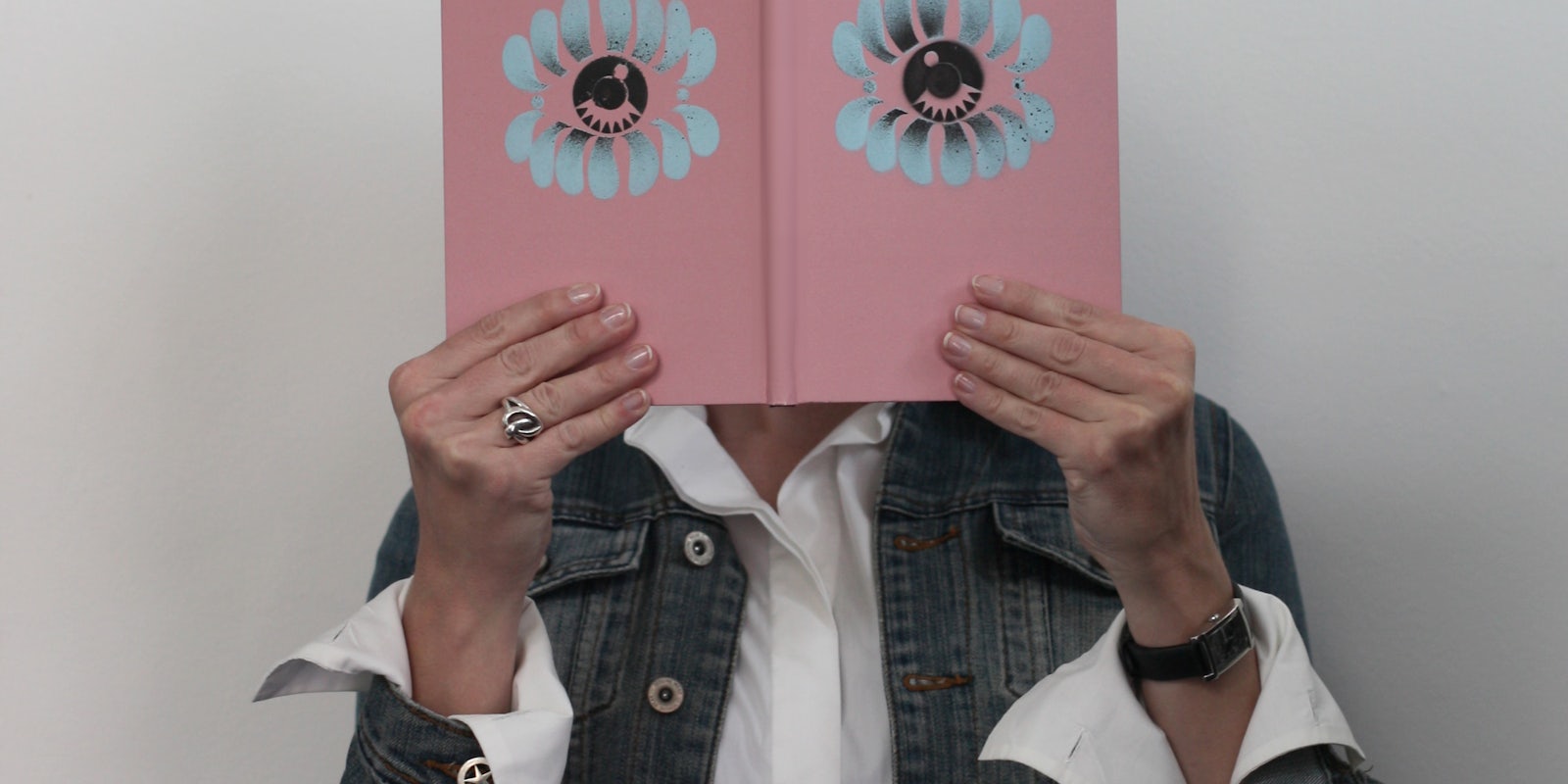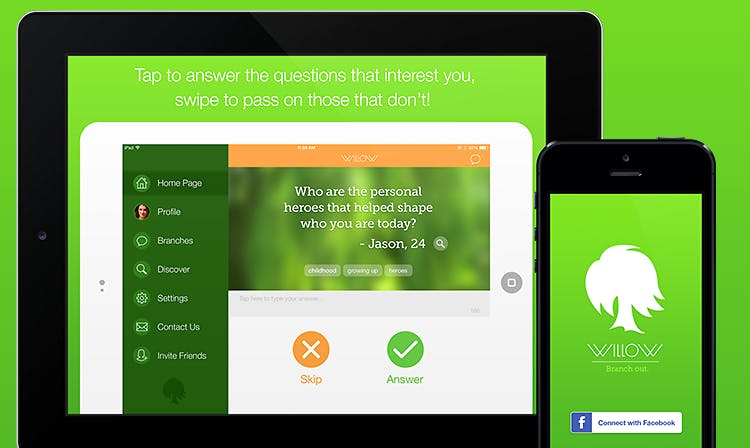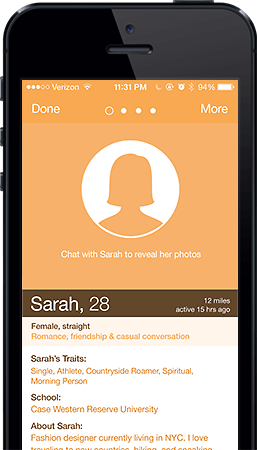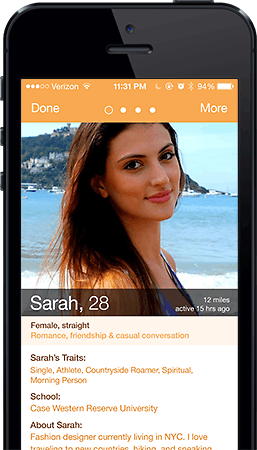What percent of attraction is physical and what percent is mental? While apps like Tinder place a premium on looks, Willow is bucking the trend and telling users to have stimulating conversations before ever seeing one another.
The app, which made a tentative beta debut this past summer, is now officially launching with a slew of new features and totally reworked user interface. Prime among the additions is the ability to keep your likeness to yourself and lead up to a big reveal.
Created by former pro skater Michael Bruch, Willow keeps its users under a veil. Instead of swiping between photos and literally encouraging people to continue the legacy of unfortunate inventions like Hot or Not, Willow replaces pictures with words. Users can ask three questions, which are then posed to others to be answered or swiped away and dismissed.
If the person who asked the question sees an answer that seems interesting, they can start up a conversation. From there, it’s up the the two to keep the discussion going. If they feel so inclined over the course of the conversation, they can choose to reveal their photos—but it won’t happen until both users agree to do so.
Bruch says the idea came from personal experience. “Starting conversations can feel artificial and awkward on other dating apps,” he said, though he also acknowledged that he saw a gap in the existing market. “I wanted to create something that really helped people get to know each other on a more personal level. I thought that questions would be a great way to facilitate and provoke meaningful conversations that really let people talk and get to know one another in a natural way.
“Because of the question prompts, there is context as soon as you start talking to someone else,” Bruch explains. “The conversations are also going to be more varied and interesting because we’ve created a space where people can ask anything to start a conversation rather than the typical ‘what do you do?,’ ‘where are you from?,’ etc.” It also saves users from the awkward attempts at ice breakers and introductions.
Bruch says that he’s seen users generating unique and creative questions. “We’ve seen people ask all kinds of questions, from lighthearted questions like ‘do you prefer your bagels toasted or untoasted?’ to more serious questions like ‘What was the last meaningful thing you did for a complete stranger?’”
While testing Willow, I found some conversation-kindling prompts that wound up leading to extended chats. There’s also a fair share of “Want to have sex?” and “Would you hook up with me?” from users (OK, dudes) who appear completely unaware of the concept of the app. That’s not the fault of Bruch or Willow, of course—that’s just par for the course. Several people I talked to on Willow lamented the fact that every site they go on, they’re inundated with guys who immediately proposition hooking up. It’s unavoidable, even in an app that wants to do better.
Luckily those who clutter the feed with propositions like that—or in the case of the impressively brazen ones, their phone number and Kik or Snapchat username—are easily swiped away in favor of more interesting conversations. I had an ongoing discussion with a Scandal fan about whether she was Team Fitz or Team Jake (she’s Team Jake, I’m Team Nobody), and a talk about tattoos. I also learned kangaroos have three vaginas and tapirs have the largest penis-to-body size ratio (I fact-checked both of these claims and they are legit).
Mostly, I found a lot of people hoping to make some sort of real connection. And maybe that makes Willow less of a dating app and more of a conversational app.
The measure of success for Willow is how well the concept actually extends conversation between people. Of the nearly 40 people I connected with on Willow, about half turned into ongoing dialogues where we spoke with some regularity. I agreed to reveal pictures with seven of those people.
Bruch says while he doesn’t yet have the analytics to quantify how long it takes for people to reveal photos (data that he’s planning to collect going forward), he could provide that “conversations where people have revealed photos, on average, are about 10 times longer than conversations where photos are not revealed.” He speculates that, “This is not necessarily indicative that revealing photos [equals] longer conversations. In fact, I suspect that longer conversation prompts photos to be revealed, as it means things are going well.”
I found that the longest conversations did eventually lead to revealing photos as Bruch suggests may be the case. But there were also a few people who immediately requested a reveal as soon as we were connected. In those cases, conversations usually sputtered to a halt. (The very first person who asked me to reveal just stopped replying to messages, which is a real confidence booster.)
In fact, even the people who I had a good rapport with, there was a brief moment of awkwardness after agreeing to share our faces with one another. Over the length of a conversation, you do start to build an image of a person in your head based off of what you learn about them. Once you’re actually seeing the person you’ve been talking with, you have to reconcile it.
When I asked Bruch about this phenomenon, he was sure to say that his views on it were based purely on speculation not empirical evidence, but he admitted that “It would be dishonest of me not to acknowledge that some of the sputtering could do with sexual attraction. Good conversation does not always mean you’ll be physically attracted to who you reveal photos with, despite the pleasant conversation occurring.”
“I think that having a great conversation with someone you don’t end up being sexually attracted to is a much better experience.”
For the user base migrating to Willow, it’s important to remember the purpose of the app. It’s not Tinder or OkCupid or Clover; it’s about finding a conversational spark first. “On an app like Tinder, matching with someone you are physically attracted to does not mean you will enjoy talking to them at all, or in many cases, even talk to them period,” Bruch says.
Bruch is curious to learn how the distance affects conversations. “I think it will be really interesting to measure how conversations go post reveal when distance is a) less than 100 miles and b) greater than 100 miles,” he says. “It might just be harder for a lot of people to keep up conversations with people they know they won’t get a chance to ever meet due to geographical constraints. Though again, this is all speculative.”
For those willing to branch out to Willow as the app becomes available Wednesday, keeping an open mind and open dialogue is key to getting use out of the app. If you’re looking for a date in your immediate area, you may leave disappointed. But if you’re looking for someone to talk to, then you’re in luck.
“Personally, I think that having a great conversation with someone you don’t end up being sexually attracted to is a much better experience than matching with people based on looks and having to deal with incompatible personalities,” Bruch says. “But that’s just me.“
Photo via brandbook.de/Flickr (CC BY SA 2.0)





